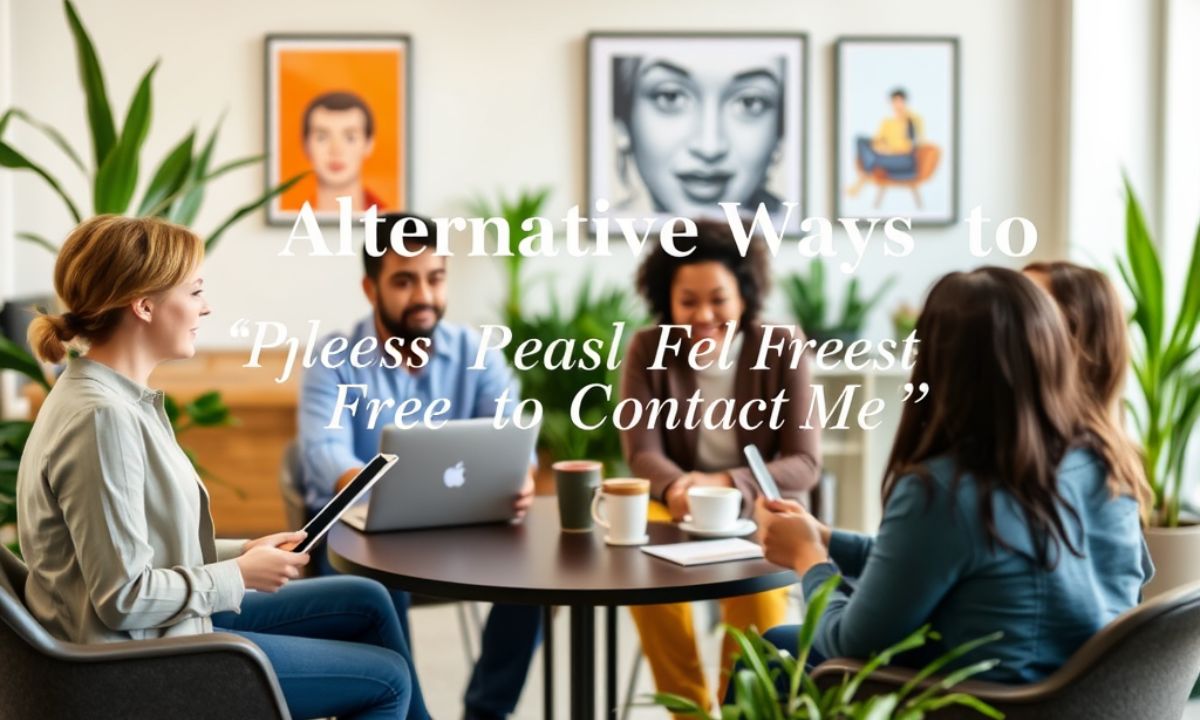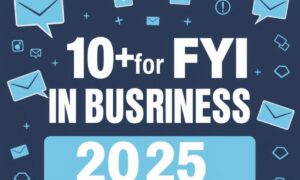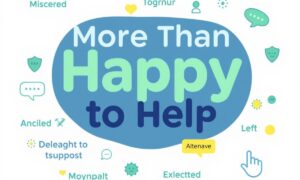Finding substitutes for “please feel free to contact me” can make your messages more interesting and personal.
Choosing the right words for the situation to establish connection and conversation is what effective communication is all about.
Fourteen alternatives help you come across as the approachable one while maintaining the adequate amount of professionalism for the context-whether writing to clients, colleagues, or friends.
READ MORE: https://travelloverage.com/say-i-am-praying-for-you/
I’m Here for Inquiries
A professional, formal substitute that fits the bill for business communications. When you say, “I’m here for inquiries,” to a client or colleague, you imply you’re ready to help, yet keeping an appropriate professional distance.
This will really work for customer service emails or professional correspondence and in business proposals.
It means you’re ready to answer questions, but without being too casual or over familiar, which makes it the right choice for new client relationships or formal business settings.
Example: I have attached our full proposal for your review, and I’m here for inquiries regarding any aspect that requires clarification.
Don’t Hesitate to Reach Out
The tone of this phrase is deliberately cordial, while remaining respectful in formal contexts. Saying, “Don’t hesitate to reach out,” creates an open environment for the person to contact you without reservation.
It works well in situations where you want to extend warmth toward your clients or colleagues. The expression goes beyond being cordial and suggests “I’m here for you” without losing professionalism.
This balance is important for maintaining a cordial professional relationship that now has some familiarity.
Example: I’ve shared the project timeline with your team, so don’t hesitate to reach out if any deadlines seem challenging.
Feel Free to Get in Touch
This is a phrase very suitable for both casual and formal contexts. It offers access to everyone and does not pressurize the individual through an open line of communication when inviting “feel free to get in touch” with that person.
This expression of approachability and engagement is perfect for networking situations, follow-up emails after meetings, or when reconnecting with old contacts.
It also works well in personal communications where one seeks to sustain contact but does not want to seem too keen or pushy.
Example: It was great to discuss potential collaboration at the conference; please feel free to connect with me if you would like to look into it further..
Please Ask Any Questions
This phrase actively invites dialogue and shows you respect the input of the other person. By providing the explicit invitation with “please ask any questions,” you are demonstrating your willingness to explain or discuss further.
This phrase is particularly effective during training sessions, client onboarding, and when educating clients about new processes or new information.
It implies that you expect questions to come up and have made yourself available to deal with them, thus setting communication free to flow and settling misunderstandings quickly.
Example: I have outlined the implementation process in the attached document, so please ask any questions before we can move forward to the next phase.
Please Don’t Hesitate to Contact
The phrase itself is a courteous invitation to the person to communicate. ‘Should you have any issues, please don’t hesitate to contact’ sounds quite formal while still appearing warm and friendly.
This phrase mainly fits well with situations such as customer service, professionals offering services, and under situations when offering help to clients or colleagues.
The ‘please’ that comes at the beginning of the phrase shows an extra layer of politeness that fairly expresses the invitation and intention to build trust in a professional relationship.
Example: Your account has been successfully updated with the new preferences, so please don’t hesitate to contact our support team if you notice any issues.
Find More Words!
The deepened vocabulary of communication expands the personalization and effectiveness of the interaction.
By actively searching for alternative expressions for “I’m all ears” or “My door is always open,” one can adapt to various audiences and situations.
Such versatility opens the door to more authentic connections with lesser-known idiosyncrasies and styles of communicating.
A strong vocabulary of phrases to assert friendliness allows any expression of availability to cater to the particular profile of who will respond-whether along an extremely formal, very informal, or an in-between communication spectrum.
Example: To boost our communications with clients, let us explore other phrases that can better describe our availability in truly personal ways away from our standard template.
I Am Available for Inquiries
Such a phrase professes professionalism and also clearly states when it is available. To tell someone as in “I am available for inquiries” means a formal yet helpful being in the presence.
Use it particularly in academia, in legal correspondence, or with highly regulated industries that maintain appropriate boundaries.
This accessible wording, then, translates within the confines of the profession and therefore very much suits situations needing approachability with authority and expertise:
Example;Following the publication of our research findings, I am available for inquiries regarding our methodology and conclusions.
Reach Out Anytime
This line expresses the impression of constant availability and support. It deems communication to work without time constraints since one is offering to reach out “whenever.”
This expression is a good candidate in mentoring relationships, in customer support roles, or instances of close working partnerships.
It communicates dedication that extends after business hours, implying that the relationship is a priority, and you will make yourself available when the need arises. That can do wonders to build up trust and loyalty.
Example: As you navigate your first month in this role, reach out anytime you encounter challenges or have questions about procedures.
Don’t Be Afraid to Contact Me
That is a phrase to consider if there is any hesitation or anxiety to contact. Saying “don’t be afraid to contact me” severs the psychological barriers to communication.
Such language is effective when addressing junior colleagues, students, or clientele who might feel intimidated.
It engenders psychological safety for an open connection, which suits settings where dynamics of power or difference in expertise may normally inhibit communication.
Example: As your supervisor on this project, don’t be afraid to contact me with questions that might seem basic—I’m here to support your learning process.
Feel Free to Reach Out
The phrase strikes a balance between politeness and a friendly attitude: by inviting someone to “feel free to reach out,” the speaker is creating an opportunity for communication but without any obligation to do so.
This expression works well and is appropriate in almost any given business context and relationship standing. It provides great flexibility within any spectrum of formality, therefore,
it serves as a dependable standby if one is uncertain regarding the appropriate level of formality. Respect and accessibility are the two variables the statement tries to communicate-the combination of which is generally appreciated in professional settings.
Example: I’ve reviewed your initial proposal and shared some feedback in the attached document, so feel free to reach out if anything needs clarification.
I’m Here if You Need Anything
This phrase encompasses comprehensive support rather than a narrow spectrum of questions. “I’m here if you need anything” expresses general open-ended assistance that includes unknown circumstances.
This expression implies sincerity and support and is suitable for situations requiring team leadership, engaging with clients in challenging project settings, and nurturing professional relationships strongly based on trust.
It is a blatant display of concern for the success and well-being of the other person, transcending transactional exchanges.
Example: While you’re implementing these changes to your system, I’m here if you need anything from additional resources to troubleshooting assistance.
Please Reach Out if Needed
The statement conveys respect for the autonomy of the other party while extending support. By saying “please reach out if needed“, one is extending assistance without presuming it will be requested.
This phrase works well when following up on the provision of information or services, sustaining support for capable coworkers or self-sufficient clients.
While respecting the other’s capabilities, it still conveys that help is on standby-creating a balanced professional dynamic.
Example: I’ve sent the completed files over for your review, so please reach out if needed as you incorporate them into your presentation.
I’m Here to Help
This statement, however, is quite directly and clearly supportive. When you tell someone, “I’m here to help,” you’re stating the purpose and directing the attention to their needs.
It doesn’t matter if you are a customer service agent, new hires coming on board, or any other kind of situation where problem-solving is the primary concern.
This phrase creates an immediate sense of allyship and support-in fact, tells that other person that you’re ready to prioritize their concerns or problems.
Example: Should you need help as you explore any features on our new client portal for the first time, I’m here.
Please Contact Me
This phrase brings up luminously clear professional courtesy. Simply put, “please contact me,” implies you are direct and polite.
This expression applies best in any time-critical situation when clear action is needed and in formal business-to-business correspondence.
The simplicity leaves no doubt that communication is welcome; however, the “please” preserves professional courtesy.
It’s short and concise if communication efficiency takes precedence over relationship-building jargon.
Example: Before proceeding with the order please contact me to confirm the delivery specifications for this custom item.
Reach Out at Any Time
Always being available without time constraint, this phrase becomes. When one says, Hang out at any time, one really means Show unparalleled access and commitment.
Such wording is most effective for emergency services, crisis contact work, and any high-priority client relationship.
It indicates a commitment beyond the accessible, indicating that the communication symbolizes an importance that transcends the average time limitations and contrivances.
Example: During this migrating system setup, feel free to reach out anytime you have a problem that is affecting your operations.
FAQ’s
What is the most appropriate phrase for formal business writing?
“I am available for inquiries” is professional while clearly indicating availability.
What’s a good phrase to use for my clients with whom I want to build a closer relationship?
“Don’t hesitate to reach out” allows for approachability but keeps professional lines intact.
How would I express availability that is urgent outside business hours?
“Reach out at any time” leaves no doubt about continuous availability regarding time-critical matters.
Which phrase is best suited to help team members or subordinates?
“I’m here to help” speaks clearly to support and puts the other person’s interests first.
What’s the most adaptable professional phrase?
“Feel free to reach out” strikes a balance between courtesy and accessibility and works well in many different situations.
Conclusion
How we extend invitations to communicate may have profound consequences for how we interact and develop relationships.
Moving away from the overused “please feel free to contact me,” we can build a much more polished, effective, and situation-appropriate invitation that can fit all sorts of contexts and relations.
The tone, formality, and promised accessibility implied in each alternative carry strategic potential where we consciously make them work to deepen our connections.
The alternate phrases we use should be selected based on thoughtful consideration of the communication context and the desired outcome.
The more accurate and honest our word choice is regarding our own availability and support, the clearer we make it for everyone concerned.
The focus should be on facilitating the contact means offered, but such that the other person feels inclined to use them.

I’m Irfan, an experienced SEO content and SEO specialist with 2 years of expertise, currently contributing to Al Jazeera News Website.












